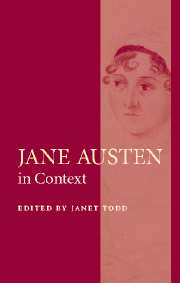30 - Nationalism and Empire
Published online by Cambridge University Press: 19 December 2020
Summary
Samuel Johnson expressed an eighteenth-century cosmopolitan attitude when he defined patriotism as ‘the last refuge of a scoundrel’ in his Dictionary. Laurence Sterne voiced a similar attitude when he travelled to Paris during the Seven Years’ War, and said ‘it never entered my mind we were at war with France’. Not everyone in England shared these perspectives, which were limited to a narrow, elite stratum. There had always been a latent, sometimes overt chauvinism in England, manifested as hostility to foreign states with which England was engaged in conflict. When Captain Robert Jenkins displayed an ear that a Spaniard had cut off in the West Indies in the 1730s the clamour for war was so great that Robert Walpole, who wanted to resolve differences with Spain through diplomacy, was forced into a war he wanted to avoid. Begun in 1739, the War of Jenkins’ Ear fed into the much larger war that broke out in the following year, the War of Austrian Succession. It was in the very year that Britain entered the War of Austrian Succession, 1740, that the first performance of Thomas Arne's masque, Alfred, was given. Its rousing chorus, ‘Rule, Britannia’, was a celebration in music of Britain's naval supremacy, the source of her greatness: ‘Awe with your navies every hostile land / Vain are their threats, their armies all in vain / They rule the world who rule the main.’ Viewed in retrospect, Arne's ‘Rule, Britannia’, whose verse was written by James Thomson, was prophetic. In the decades that followed the first hearing of ‘Rule, Britannia’ Britain emerged victorious from an all-out struggle with France, and it was through naval superiority and power that she did so.
The War of Austrian Succession, fought between 1740 and 1748, set the stage for a larger conflict that began in the American wilderness in 1754, the French and Indian War; that war escalated into the Seven Years’ War two years later, waged between 1756 and 1763 in Europe, North America, India, the West Indies and West Africa.
- Type
- Chapter
- Information
- Jane Austen in Context , pp. 327 - 336Publisher: Cambridge University PressPrint publication year: 2005
- 1
- Cited by



